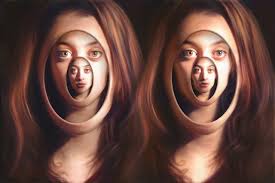We come into the condition we call life, and pass out of it. In between birth and death, we wonder at the nature of our own being. We search our experience and study official histories of the past, hoping to find their clues as to the nature of our own reality.
Our life seems synonymous with our consciousness. Therefore it appears that our knowledge of oneself grows gradually, as our self-consciousness develops from our birth. It appears, furthermore, that our consciousness will meet a death beyond which our self-consciousness will not survive. We may think longingly and with an almost hopeful nostalgia of the religion of our childhood, and remember a system of belief that ensured us of immortality. Yet most of us, yearn for some private and intimate assurances, and seek for some inner certainty that our own individuality is not curtly dismissed at death. Each person knows intuitively that his or her own experience somehow matter, and that there is a meaning, however obscured, that connects the individual with a greater creative pattern. Each person senses now and then a private purpose, and yet many are filled with frustration because that inner goal is not consciously known or clearly apprehended.
When we were children we knew we were growing toward an adulthood. We were sustained by the belief in projected abilities–that is, we took it for granted that we were in the process of learning and growing. No matter what happened to us, we lived in a kind of rarefied psychic air, in which our being was charged and glowing. We knew we were in a state of becoming. The world, in those terms, is also in a state of becoming.
In private life and on the world stage, action is occurring all the time. It is easy to look at oneself or at the world, to see oneself and become so hypnotized by our present state that all change or growth seems impossible, or to see the world in the same manner.
We do not remember our birth, as a rule. Certainly is seems that we do not remember the birth of the world. We had a history, however, before our birth — even as it seems to us that the world had a history before we were born.
The sciences still keep secrets from each other. The physical sciences pretend that the centuries exist one after the other, while the physicists realize that time is not only relative to the perceiver, but that all events are simultaneous. The archeologists merrily continue to date the remains of “past” civilizations, never asking themselves what the past means — or saying: “This is the past relative to my point or perception.”
Astronomers speak of outer space and of galaxies that would dwarf our own. In the world that we recognize there are also wars and rumors of wars, prophets of destruction. Yet in spite of all, the private man or the private woman, unknown, anonymous to the world at large, stubbornly feels within a rousing, determined affirmation that says: “I am important. I have a purpose, even though I do not understand what it is. “My life that seems so insignificant and inefficient, is nevertheless of prime importance in some way that I do not recognize.”
Though caught up in life of seeming frustration, obsessed with family problems, uneasy in sickness, defeated it seems for all practical purposes, some portion of each individual rouses against all disasters, all discouragements, and now and then at least glimpses a sense of enduring validity that cannot be denied. It is to that knowing portion of each individual I Speak to.








XYZ 國中基測
http://xyz.net.tw/
歐客佬精品咖啡
https://blog.oklaocoffee.tw/
XYZ 壯陽藥春藥專賣店 大量購買有優惠
https://man-r20.com/